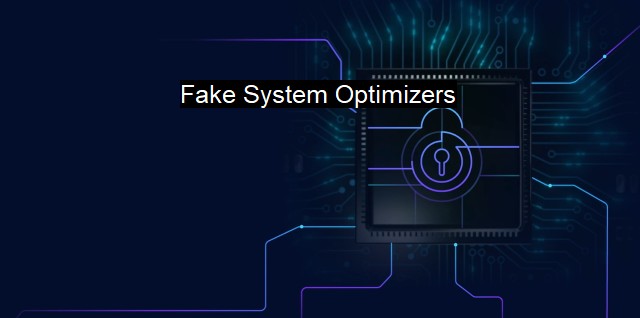What are Fake System Optimizers?
The Rise of Fake System Optimizers: A Growing Cybersecurity Concern for Computer Users
'Fake System Optimizers' are a type of malicious software, often referred to as malware. These harmful programs disguise themselves as legitimate system optimization tools for computers and other digital devices, promising to help users enhance system performance, free up storage space, and clean up the registry, among other similar tasks.Instead of genuinely solving or improving system-related issues, fake system optimizers serve a far more sinister purpose. They primarily act as a scareware by raising false alarms about nonexistent system errors, viruses, malfunctions, and threats. The ultimate motive behind these phony alerts is to scare unsuspecting users and pressurize them into purchasing a 'full version' or 'premium package' of the same bogus software. This part of the process marks the point at which fake system optimizers create a profitable operation for their developers, often cybercriminals.
As the name suggests, fake system optimizers fulfill none of the promises they make. They neither optimize systems nor isolate threats, and downloading one would certainly do more harm than good. A closer inspection would reveal that these so-called optimizers, instead of enhancing system performance, slow it down and even harm the device by making unnecessary changes or installing other types of malware.
Fake system optimizers use deceptive advertising techniques, such as pop-ups, fake system security alerts, or even endorsement from fraudulent IT ‘experts’ or websites. Cybercriminals promoting these fake tools are also known to attach their software to other legitimate software downloads. They frequently target users with limited technical knowledge; experienced users too can sometimes fall prey.
During this process, cybercriminals often gain access to sensitive information that users must provide while making a purchase – more than just financial exploitation, fake system optimizers could result in threats such as identity theft, black hat hacking, and other cybersecurity vulnerabilities.
Notwithstanding fake system optimizers' tactics, vigilant users can protect themselves from such threats. Here are few indicators that a system optimizer may be a scam: exaggerated error reports, high-pressure sales mistakes, spelling or grammar errors in the product description, pop-ups or alerts appearing during the system scanning process claiming urgent action is required, or the software being packaged with other known forms of malware in the download.
Taking simple preventive measures like regular software updates, using trusted antivirus software, finding genuine reviews before downloading software, being cautious about pop-up advertisements, and not sharing personal and sensitive information without verification, could significantly reduce the risk of falling victim to a fake system optimizer.
Simply put, protection against fake system optimizers largely involves spotting key signs of deception and exercising due diligence when considering system optimization tools. Given the growing number of diverse and continually evolving cyber threats, strong cybersecurity understanding is a must for every digitized system's users.
“The best defense is a good offense”, and that means staying informed, remaining vigilant, and responding swiftly. By understanding what fake system optimizers are and how they operate, individuals and organizations make an essential stride in maintaining a safer cyberspace.

Fake System Optimizers FAQs
What are fake system optimizers?
Fake system optimizers are malicious programs that pretend to be legitimate system optimization tools but actually harm your system. They usually scan your computer for non-existent issues, exaggerate the severity of issues that do exist, and prompt you to buy their paid version to fix these issues, even though there is nothing wrong with your system.How do fake system optimizers endanger my cybersecurity?
Fake system optimizers can do more harm than good to your computer, as they can install spyware, malware, or other harmful software on your system. They can also steal your personal data, such as login credentials, credit card information, or other sensitive data, and use it for malicious purposes.How can I identify a fake system optimizer?
Fake system optimizers often use scare tactics to lure users into buying their paid version or clicking on a link. They may display pop-up messages or warning signs, ask for permission to access your system, or redirect you to their websites. To avoid falling into their traps, you should only download system optimization software from reputable sources, such as the manufacturer's website or a trusted download site.How can I protect myself from fake system optimizers?
To protect yourself from fake system optimizers, you should keep your antivirus software up-to-date and scan your computer regularly. You should also be cautious when downloading new software and avoid clicking on suspicious links, pop-ups, or ads. If you suspect that your computer has been infected with fake system optimizers or any other malware, you should run a full system scan, remove the threats, and change your passwords to prevent further damage.| | A | | | B | | | C | | | D | | | E | | | F | | | G | | | H | | | I | | | J | | | K | | | L | | | M | |
| | N | | | O | | | P | | | Q | | | R | | | S | | | T | | | U | | | V | | | W | | | X | | | Y | | | Z | |
| | 1 | | | 2 | | | 3 | | | 4 | | | 7 | | | 8 | | |||||||